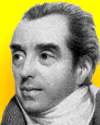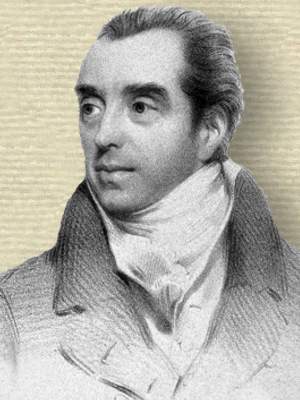 (source)
(source)
|
Charles Hatchett
(2 Jan 1765 - 10 Mar 1847)
English chemist who discovered an element he called columbium in 1801, while analyzing columbite, a complex mineral in the Hans Sloane Collection of the British Museum. Hatchett detected, but did not isolate, the new element, which we now know as niobium.
|
Science Quotes by Charles Hatchett (2 quotes)
Considering, therefore, that the metal which has been examined is to different from those hitherto discovered, it appeared proper that it should be distinguished by a peculiar name; and, having consulted with several of the eminent and ingenious chemists of this country, I have been induced to give it the name of Columbium.
— Charles Hatchett
Opening paragraph from Paper (26 Nov 1801) read to the Royal Society, printed in 'Analysis of a Mineral Substance From North America, Containing a Metal Hitherto Unknown', Philosophical Transactions (1802), 92, 65.
When I was examining and arranging some minerals in the British Museum, I observed a small specimen of a dark colored substance, which attracted my attention, on account of some resemblance which it had with the Siberian chromate of iron, on which I that time was making experiments. Upon referring to Sir Hans Sloane’s catalog, I found that this specimen was only described as a very heavy black stone with golden streaks, which proved to be yellow mica, and it appeared that it had been sent…to Sloane by Mr, Winthrop, of Massachusetts.
— Charles Hatchett
Opening paragraph from Paper (26 Nov 1801) read to the Royal Society, printed in 'Analysis of a Mineral Substance From North America, Containing a Metal Hitherto Unknown', Philosophical Transactions (1802), 92, 49.
Quotes by others about Charles Hatchett (1)
This is, in truth, the first charm of chemistry, and the secret of the almost universal interest excited by its discoveries. The serious complacency which is afforded by the sense of truth, utility, permanence, and progression, blends with and ennobles the exhilarating surprise and the pleasurable sting of curiosity, which accompany the propounding and the solving of an Enigma... If in SHAKPEARE [sic] we find Nature idealized into Poetry, through the creative power of a profound yet observant meditation, so through the meditative observation of a DAVY, a WOOLLASTON [sic], or a HATCHETT; we find poetry, as if were, substantiated and realized in nature.
Essays on the Principle of Method, Essay VI (1818). In The Collected Works of Samuel Taylor Coleridge: The Friend (1969), Vol. 4, 1, Barbara E. Rooke (ed.), 471.
See also:
- 2 Jan - short biography, births, deaths and events on date of Hatchett's birth.

 In science it often happens that scientists say, 'You know that's a really good argument; my position is mistaken,' and then they would actually change their minds and you never hear that old view from them again. They really do it. It doesn't happen as often as it should, because scientists are human and change is sometimes painful. But it happens every day. I cannot recall the last time something like that happened in politics or religion.
(1987) --
In science it often happens that scientists say, 'You know that's a really good argument; my position is mistaken,' and then they would actually change their minds and you never hear that old view from them again. They really do it. It doesn't happen as often as it should, because scientists are human and change is sometimes painful. But it happens every day. I cannot recall the last time something like that happened in politics or religion.
(1987) -- 


